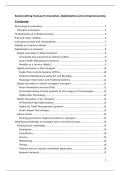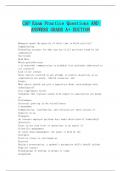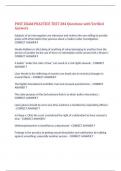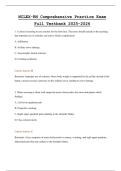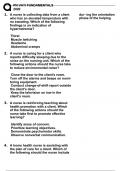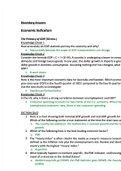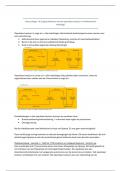coverage, 100% Accurate, rated A.
Verified.
Mesopotamia - ✔✔-A region between the Tigris and Euphrates rivers that developed the first urban
societies. In the Bronze Age this area included Sumer and the Akkadian, Babylonian and Assyrian
empires, In the Iron Age, it was ruled by the Neo-Assyrian and Neo-Babylonian empires.
Fertile Crescent - ✔✔-The Tigris and Euphrates Rivers gave life to the first known agricultural villages in
this area about 10,000 years ago and the first known cities about 5,000 years ago.
ziggurat - ✔✔-A temple tower of ancient Mesopotamia, constructed of square or rectangular terraces of
diminishing size, usually with a shrine made of blue enamel bricks on the top
pictograms - ✔✔-A pictorial symbol or sign representing an object or concept
cuneiform - ✔✔-The earliest known form of writing, which was used by the Sumerians. The name
derives from the wedge shaped marks made with a stylus into soft clay. Used from the 3000s BCE to the
100s BCE.
ideograms - ✔✔-A character or figure in a writing system in which the idea of a thing is represented
rather than it's name (example: Chinese)
Sumer - ✔✔-The world's first civilization, founded in Mesopotamia, which existed for over 3,000 years.
Xia - ✔✔-A legendary Chinese dynasty that was not believed to exist until relatively recently. Walled
towns ruled by area-specific kings assembled armies, built cities, and worked bronze. Created
pictograms which would evolve in to the first Chinese script.
,Shang Dynasty - ✔✔-An early Chinese dynasty. Not a unified Chinese state. Instead rulers and their
relatives gave orders through a network of cities. Earliest evidence of Chinese writing comes from this
period.
Zhou Dynasty - ✔✔-Succeeded the Shang dynasty. Similar to the Shang And Xia dynastic periods in that
China was fragmented politically. Yet, despite the lack of true centralization, this was one of the longest
Chinese dynasties, lasting about 600 years. It left substantial written records, unlike the preceding
dynasties.
Yellow River - ✔✔-Also known as the Huang-He. The second longest river in China. The majority of
ancient Chinese civilizations originated in its valley.
Oracle Bones - ✔✔-The earliest known Chinese writing is found on these from ritual activity of the Shang
period.
Teotihuacan - ✔✔-A large central city in the Mesoamerican region. Located about 25 miles Northeast of
present day Mexico City. Exhibited city planning and unprecedented size for its time. Reached its peak
around the year 450.
Jenne-Jeno - ✔✔-One of the first urbanized centers in western Africa. A walled community home to
approximately 50,000 people at its height. Evidence suggests domestication of agriculture and trade
with nearby regions.
Great Zimbabwe - ✔✔-A stone-walled enclosure found in Southeast Africa. Have been associated with
trade, farming, and mining.
Hammurabi - ✔✔-The first king of the Babylonian Empire. Best known for his legal code.
Code of Hammurabi - ✔✔-A collection of 282 laws. One of the first (but not THE first) examples of
written law in the ancient world.
Hittites - ✔✔-An ancient Anatolian group whose empire at largest extent consisted of most of the
Middle East. Some of the first two-wheeled chariots and iron.
,Zoroastrianism - ✔✔-One of the first monotheistic religions, particularly one with a wide following. It
was central to the political and religious culture of ancient Persia.
Zoroaster - ✔✔-The founder of Persia's classical pre-Islamic religion.
Hellenistic - ✔✔-Of or influenced by the Greek Empire. A type of culture typically referred to after the
conquests of Alexander the Great.
Trireme - ✔✔-Greek ships built specifically for ramming enemy ships.
Minoans - ✔✔-One of the early proto-Greek peoples from 2600 BCE to 1500 BCE. Inhabitants of the
island of Crete. Their site of Knossos is pictured above.
Acropolis - ✔✔-Greek for "high city". The chief temples of the city were located here.
Plato - ✔✔-Socrates' most well known pupil. Founded an academy in Athens.
Pax Romana - ✔✔-The "Roman Peace", that is, the state of comparative concord prevailing within the
boundaries of the Roman Empire from the reign of Augustus (27 B.C.E.-14 C.E.) to that of Marcus
Aurelius (161-180 C.E.)
Republic - ✔✔-A state that is not ruled by a hereditary leader (a monarchy) but by a person or persons
appointed under the constitution
Centuries - (not the time period) - ✔✔-The smallest units of the Roman army, each composed of some
100 foot soldiers and commanded by a centurion. A legion was made up of 60 of these. They also
formed political divisions of Roman citizens.
Consul - ✔✔-Under the Roman Republic, one of the two magistrates holding supreme civil and military
authority. Nominated by the Senate and elected by citizens in the Comitia Centuriata, the consuls held
office for one year and each had power of veto over the other.
, Patricians - ✔✔-land-owning noblemen in Ancient Rome
Plebeians - ✔✔-all non-land-owning, free men in Ancient Rome
Paterfamilias - ✔✔-the head of the family or household in Roman law -always male- and the only
member to have full legal rights. This person had absolute power over his family, which extended to life
and death.
Twelve Tables - ✔✔-Completed in 449 BCE, these civil laws developed by the Roman Republic to protect
individual following demands by plebeians.
Triumvirate - ✔✔-An unofficial coalition between Julius Caesar, Pompey, and Crassus was formed in 60
B.C.E.
Monophysites - ✔✔-The supporters of a doctrine in the early Christian Church that held that the
incarnate Christ possessed a single, wholly divine nature. they opposed the orthodox view that Christ
had a double nature, one divine and one human, and emphasized his divinity at the expense of his
capacity to experience real human suffering.
Julius Caesar - ✔✔-Part of the first triumvirate who eventually became "emperor for life". Chose not to
conquer Germany. Was assassinated by fellow senators in 44 B.C.E.
Octavian - ✔✔-Part of the second triumvirate whom the power eventually shifted to. Assumed the
name Augustus Caesar, and became emperor. Was the end of the Roman Republic and the start of the
Pax Romana.
Diocletian - ✔✔-Roman emperor of 284 C.E. Attempted to deal with fall of Roman Empire by splitting
the empire into two regions run by co-emperors. Also brought armies back under imperial control, and
attempted to deal with the economic problems by strengthening the imperial currency, forcing a budget
on the government, and capping prices to deal with inflation. Civil war erupted upon his retirement.


